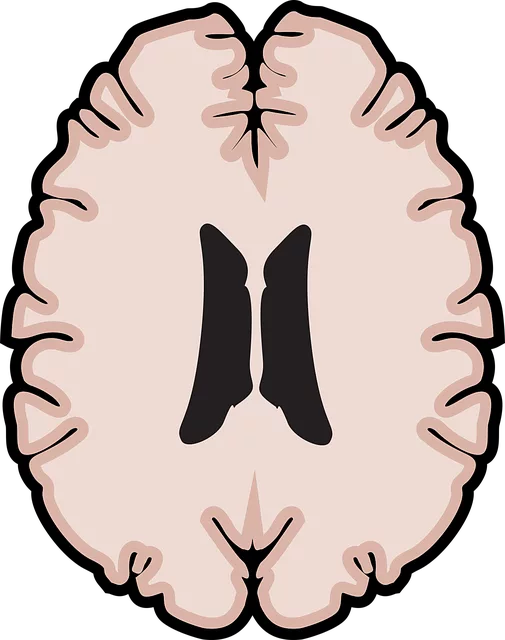Cultural competency in healthcare is vital for delivering respectful, effective care to diverse patients, especially in mental health services. A study by Kaiser Permanente (2023) showed that culturally sensitive practices in psychiatry improved patient engagement and satisfaction, particularly in diverse communities. In Golden, Colorado, healthcare providers must be trained to offer empathetic, bias-free care, incorporating positive thinking and trauma support. This ensures patients from various cultural backgrounds receive inclusive treatment for effective recovery. Kaiser Permanente's training programs on cultural competency, risk assessment, self-care, and stress reduction combat biases impacting diverse patient care. Interactive workshops, case studies, and role-playing scenarios transform provider training, with regular updates reflecting societal changes. Evaluating program success through post-training assessments shows improved psychiatric services in diverse communities, driving continuous improvement in inclusive healthcare environments.
“Cultural competency in healthcare is more than a buzzword; it’s an essential framework for delivering equitable patient care. This comprehensive guide explores the critical need for cultural training among healthcare providers, examining its impact on diverse populations, particularly through case studies from industry leader Kaiser Permanente. We delve into mental health services, offering insights on enhancing psychiatric care with cultural sensitivity. Additionally, best practices and resources for effective training are provided, along with strategies to measure success in cultural competency programs.”
- Understanding Cultural Competency in Healthcare: A Necessary Framework
- The Impact of Cultural Biases on Patient Care: Case Studies from Kaiser Permanente
- Enhancing Mental Health Services: Psychiatry and Cultural Sensitivity
- Training Approaches for Healthcare Providers: Best Practices and Resources
- Measuring Success: Evaluating the Effectiveness of Cultural Competency Programs
Understanding Cultural Competency in Healthcare: A Necessary Framework

Cultural competency in healthcare is a vital framework that ensures providers deliver quality care tailored to patients’ diverse cultural backgrounds and beliefs. This approach recognizes that understanding cultural nuances can significantly impact patient outcomes, especially in mental health services. For instance, a study by Kaiser Permanente (2023) highlighted how culturally sensitive practices in psychiatry improved patient engagement and satisfaction, particularly among diverse communities.
In the context of Golden, Colorado, where cultural diversity thrives, healthcare providers must be equipped to offer empathetic care, avoiding assumptions or stereotypes that could hinder effective treatment. Positive thinking and trauma support services are integral components of this training, as it equips professionals with crisis intervention guidance, enabling them to respond sensitively to patients’ unique needs, fostering a safe and inclusive environment for recovery.
The Impact of Cultural Biases on Patient Care: Case Studies from Kaiser Permanente

Cultural biases among healthcare providers can significantly impact patient care, leading to misdiagnoses and inadequate treatment plans. A notable example comes from Kaiser Permanente, a large healthcare organization known for its comprehensive services, including psychiatry. Case studies within Kaiser Permanente have revealed that cultural biases, often unconsciously, influence the way mental health professionals assess and treat patients. For instance, a study focusing on Asian American patients highlighted how providers’ assumptions about their experiences with mental health issues due to cultural differences led to delayed diagnoses and inappropriate treatment approaches. This underscores the critical need for mental health professionals to recognize and address their own biases during patient interactions.
The consequences of such biases can be severe, affecting not just individual patients but also contributing to broader health disparities. To mitigate these risks, Kaiser Permanente has implemented training programs focused on cultural competency, risk assessment for mental health professionals, and self-care routine development for better mental health. Additionally, promoting stress reduction methods among healthcare providers is essential to ensure they can effectively support patients from diverse backgrounds. These initiatives reflect a growing awareness of the importance of cultural sensitivity in psychiatry, aiming to improve patient outcomes and foster more inclusive care environments.
Enhancing Mental Health Services: Psychiatry and Cultural Sensitivity

In today’s diverse society, healthcare providers must be equipped with cultural competency skills to deliver effective care to all patients, especially those from varied ethnic and cultural backgrounds. This is particularly crucial in the realm of mental health services, where psychiatry plays a vital role. Training programs focused on building empathy and fostering understanding can significantly enhance patient-provider relationships. By integrating cultural sensitivity into psychiatric practice, healthcare professionals can create a more inclusive environment, ensuring that every individual receives personalized treatment tailored to their unique needs.
Kaiser Permanente, for instance, recognizes the importance of these initiatives and offers resources to support mental health awareness and burnout prevention among its psychiatrists. Through educational workshops and ongoing training, they equip their providers with empathy-building strategies to navigate the complex issues faced by patients from diverse cultural settings. This approach not only improves patient outcomes but also helps psychiatrists in Golden, and elsewhere, to provide more compassionate and culturally competent care.
Training Approaches for Healthcare Providers: Best Practices and Resources

Healthcare provider training on cultural competency is evolving to meet the diverse needs of modern patients. Best practices include interactive workshops, case studies, and role-playing scenarios that encourage empathetic understanding and effective communication across cultural boundaries. These sessions should be regularly updated to reflect contemporary societal shifts and incorporate perspectives from underrepresented groups.
Resources such as Kaiser Permanente’s psychiatric services (accessible via their phone number) offer valuable insights into Mental Health Education Programs Design. They also sponsor initiatives like the Mental Wellness Podcast Series Production, which provides engaging content for healthcare professionals looking to expand their cultural competency skills. Furthermore, integrating Mental Illness Stigma Reduction Efforts into training curricula can foster inclusive environments, ultimately enhancing patient care and outcomes.
Measuring Success: Evaluating the Effectiveness of Cultural Competency Programs

Evaluating the success and effectiveness of cultural competency programs is a crucial step in ensuring their long-term impact. Measuring success goes beyond simple participation; it involves assessing tangible improvements in healthcare delivery and patient outcomes. One effective method is through post-training assessments, where participants reflect on their newfound knowledge and skills. These evaluations can capture insights into how cultural competency training has influenced their interactions with diverse patients, potentially leading to better diagnosis, treatment plans, and overall patient satisfaction.
For example, a study conducted by Kaiser Permanente might reveal significant improvements in psychiatric services provided to diverse communities. The research could highlight enhanced coping skills development and mood management techniques among healthcare providers after the training program. By measuring such outcomes, organizations like Kaiser Permanente can justify the value of their cultural competency initiatives, ensuring continuous improvement and encouraging positive changes in patient care, particularly for marginalized groups. This data-driven approach is vital to navigating complex healthcare landscapes and fostering inclusive environments.
Cultural competency training is a transformative tool in healthcare, as evidenced by the case studies from Kaiser Permanente. By addressing biases and enhancing mental health services, providers can improve patient outcomes significantly. The best practices and resources outlined in this article offer a solid framework for implementing effective cultural competency programs. Remember that ongoing education and evaluation, such as measuring success through established metrics, are crucial to ensuring these initiatives remain impactful. For more support, interested parties can explore available resources and consider reaching out to organizations like Kaiser Permanente or seeking guidance from mental health professionals via the Golden Psychiatry phone number.






